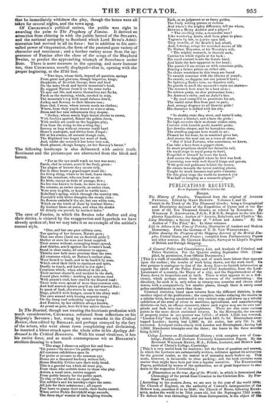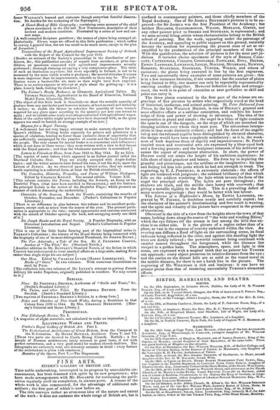PUBLICATIONS RECEIVED, From September 26th to October 3d.
SOCKS.
The History of Sweden. Translated from the original of ANDERS FRYXELL. Edited by MARY BOWITT. VOlGrOeS 1. and IL Travels in the Track of the Ten Thousand Greeks; being a Geographical and Descriptive Account of the Expedition of Cyrus and of else Re- treat of the Ten Thousand Greeks, as related by Xenophon. By WILLsaar F. AINSWORTH, F.G.S., F.R.G.S., Surgeon to the late Eu- phrates Expedition ; Author of "Assyria, Babylonia and Chaldea,"&c. Lucy Hardinge; a Second Series of "Afloat and Ashore." By the Author of "The Pilot," &c. In three volumes.
Life in Athens in the Time of Pericles, illustrative of Ancient and Modern :Democracy. From the German of T. H. YON WESSENBERG. Tables showing the Progress of the Shipping Interest of the British Era- pire, United States, and France ; compiled from Parliamentary Papers and other sources. By GEORGE BAYLEY, Surveyor to Lloyd's Register of British and Foreign Shipping.
A General Police and Constabulary List, and Analysis of Criminal and Police Statistics. For the Quarter ending September 1844. (Com- piled, by permission, from Official Documents.) [This is a work of considerable utility, and of much more labour than appears upon the surface ; the results of work being shown, not the work itself'. Ita first purpose is analogous to that of the Army List—to furnish information as regards the chiefs of the Police Force and Civil Authorities, from the Lord- Lieutenant of a county, the Mayor of a city, and the Superintendent of the Force, down to Inspectors and so forth. There is what appears to us a defi- ciency, which perhaps arises from the newness of the undertaking : the directory, for such it is, only refers to twenty-one counties and eleven chief towns, with a comparatively few smaller places, though there is surely some police establishment in more than these. Criminal statistics, based upon returns from the different districts, is also another object of the publication - the compiler, besides reducing the results to
a tabular form, having constructed a very curious map, and drawn up a tabular exhibition of the state of crime in maritime, agricultural, and manufacturing districts—in fact, an offence-measurer, where each region may see its own tur- pitude and look into that of its neighbours. There are also some curious points in the more direct statistical returns. In the Metropolis, the amount of property stolen in one quarter was 7,0711.; of which 1,354/. was restored.
"London City" lost only 1,302/., and got back 440/. 7s. 6d. Birmineham over- topped London ; having had 1,393/. 4s. 2d. stolen, but only 781. 78. 2d. recovered. Liverpool ranks closely with London and Birmingham; having lost 1,390/. Manchester triumphs over the three; the losses in the three months being 3,1451.] College Lectures on Ecclesiastical History ; with complete sets of Cam- bridge, Dublin, and Durham University Examination Papers. By the Reverend WILLIAM BATES, M.A., Fellow, Lecturer, and Hebrew Lec- turer of Christ's College, Cambridge. This is a very useful book for students; but the form of question and answer, in which the Lectures are substantially written, militates against its attraction
for the general reader, as the matter is of necessity much broken up. This mode, however, is favourable to close packing; and the book contains more matter than might have been put into a regular narrative. The Examination Papers, published by means of the authorities, are of great importance to stu- dents in the respective Universities.]
A Dissertation on the true Age of the World; in which is determined the Chronology of the period from Creation to the Christian Era. By Pro- fessor WALLACE.
[According to the modern Jews, we are now in the year of the world 5604;
the Church of England, on the authority of USHER'S interpretation of the Hebrew text, considers it to be 5848; the Church of Rome, following Buse- erns, makes the world to be 7044 years old, but the Septuagint 7322 yeso. To deduce the true chronology from these discrepancies, is the object of the fessor WALLACE'S learned and elaborate though somewhat fanciful disserta- tion. He decides for the reckoning of the Septuagint.] A IIand-Book of Bible Geography ; containing some account of the chief places mentioned in the Old and New Testaments, descriptive of their ancient and modern condition. Illustrated by a series of new and cor- rect maps.
[A well-compiled Scripture gazetteer ; the names of places being arranged al- phabetically. Eleven maps are affixed to this little publication ; which suffice to convey a general idea, but are too small to do much more, except in the plan of Jerusalem.]
Transactions of the Royal Agricultural Improvement Society of Ireland, with the Report of the Council for the year 1843. [Besides an account of the Society's proceedings in the distribution of pre- miums, &c., this publication consists of reports from members, or prize can- didates, on questions connected with agricultural improvements actually performed ; thorough draining occupy ing a very conspicuous place. The value of such an institution any.% here, but more especially in Ireland, is not to be measured by the mere visible results it produces ; the mental stimulus it causes is more important than its improvements, valuable as these may be. The pub- lication wears a businesslike air, more so than might have been expected. There is no useless expense or attempt at style about the getting-up : it is a plain, homely book, looking its character.] The Farmer's Ready Reckoner, or Glasnevin Agricultural Tables. By THOMAS SHILLING, Agriculturist to the Board of Education, National Model Farm, Glasnevin, Dublin.
[The object of this little book is threefold—to show the acreable quantity of produce from any particular part however minute, at least as small as 9 inches by 3 inches ; to enable the farmer to calculate the quantity of bone manure required for any given space according to the quantity per acre you intend to apply ; and to exhibit some ready reckonings connected with agricultural wages. Some of the earlier tables might perhaps have been dispensed with, as the space appears too small to furnish an average example of an acre.]
Rhymes for a Royal Nursery.
[A well-meant but not very happy attempt to make nursery-rhymes for the Queen's children. Writing books expressly for princes and princesses is a species of adulation, tending to foster those exclusive ideas of superiority that are sufficiently encouraged by the practice of courts and the loyal fondness of the people. The only excuse for special books is to counteract such influences ; which is not done in these verses : they seem written with a view to find favour with the Royal parents ; and thus the wholesome corrective is neutralized.] Letters to Friends at Home, from June 1843 to May 1844. By an Idler. [The reprint of some letters which appeared in an Indian journal called the Overland Calcutta Star. They are chiefly occupied with Anglo-Indian topics ; and the writer seems to have formed his tone, if not his style, upon the Letters of Tomos. As we observed upon a former series, they are scarcely worth reprinting in a collected form, at least for British circulation.] The Comedies, Histories, Tragedies, and Poems of William Shakspere. Edited by CHARLES KNIGHT. The second edition. "Volume X11. This volume contains the Poems, including the Sonnets, an Essay on the Doubtful Plays, (that have been ascribed to SITAKSPERE,) and the Indexes. Its principal feature is the review of the Doubtful Plays; which presents an account of each in discussing the authenticity.] Chronicles of the Seasons. Book the Fourth, containing the months of October, November, and December. (Parker's Collections in Popular Literature.)
[There is no difference in plan between this volume and its excellent prede- cessors, except such as arises from the season of the year. The present publi- cation is appropriate to the time; natural appearances and customs connected with the month of October opening the book, and occupying nearly one third of it.]
Sir Joseph Banks and the Royal Society. A Popular Biography, with an Historical Introduction and Sequel. (Parker's Collections in Popular Literature.) [This is one of the little books forming part of the biographical series in PARKER'S Collections ; the history of the Royal Society being connected with the biography of one of its most distinguished Presidents, Sir JOSEPH BANKS.] The Two Admirals ; a Tale of the Sea. By J. FENIMORE COOPER,
Author of "The Pilot," &c. (Standard Novels.)
[Another addition to Mr. BENTLEY'S Standard Novels, of the fiction in which COOPER has endeavoured to treat nautical affairs on a large scale, making fleets rather than single ships his sea-subject.] Our Men. Edited by CHARLES LEVER (HARRY LORREQUER). Tam Burke of" Ours." In two volumes. With numerous illustrations on steel, by Pniz. [The collection into two volumes of Mr. LEVER'S attempt to portray French military life under Napoleon, originally published in numbers. We may return to it.]
SERIALS.
Nina. By FREDRIKA BREMER, Authoress of "Strife and Peace," &c. (Smith's Standard Library.) The Twins, and other Tales. By FREDRIKA BREMER. From the Swedish. (Smith's Standard Library.) [Two reprints of FREDRIHA BREMER'S fictions, in Et cheap form.] Notes and Sketches of New South Wales, during a Residence in that Colony from 1839 to 1844. By MTS. CHARLES MEREDITH. (Mur- ray's Colonial and Home Library.)
PERIODICALS.
New Edinburgh Review, No. I.
[A. magazine of slight materials, not calculated to make an impression.] ILLUSTRATED WORKS AND PRINTS.
Finden's Royal Gallery of British Art. Part 1.
The Ecclesiastical Architecture of Great Britain, from the Conquest to the &formation. By HENRY BOWMAN, Architect. Parts V. and VI. [These two parts are devoted to Castle Rising Church, Norfolk ; a fine sample of Norman architecture, lately restored in good taste, if not with perfect correctness, and a very good model for modern church-builders. The lithographs are extremely neat, and minutely accurate in detail : every feature of the architecture is given with exactness.] Beauties of the Opera, Part V.—The Huguenots.



























 Previous page
Previous page